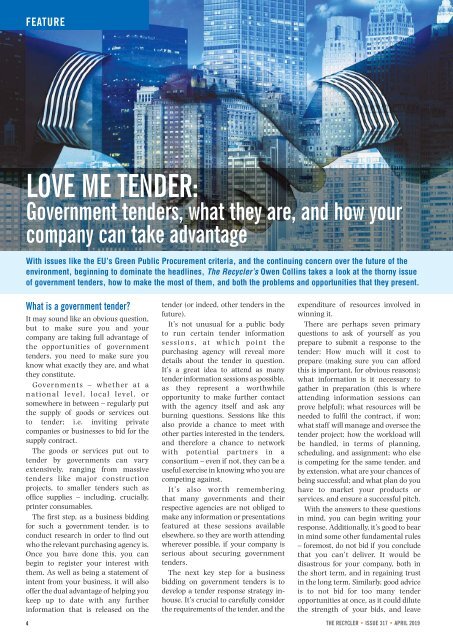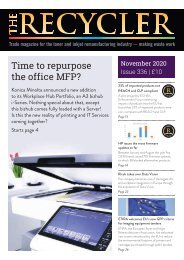The Recycler Issue 317
You also want an ePaper? Increase the reach of your titles
YUMPU automatically turns print PDFs into web optimized ePapers that Google loves.
FEATURE<br />
LOVE ME TENDER:<br />
Government tenders, what they are, and how your<br />
company can take advantage<br />
With issues like the EU’s Green Public Procurement criteria, and the continuing concern over the future of the<br />
environment, beginning to dominate the headlines, <strong>The</strong> <strong>Recycler</strong>’s Owen Collins takes a look at the thorny issue<br />
of government tenders, how to make the most of them, and both the problems and opportunities that they present.<br />
What is a government tender?<br />
It may sound like an obvious question,<br />
but to make sure you and your<br />
company are taking full advantage of<br />
the opportunities of government<br />
tenders, you need to make sure you<br />
know what exactly they are, and what<br />
they constitute.<br />
Governments – whether at a<br />
national level, local level, or<br />
somewhere in between – regularly put<br />
the supply of goods or services out<br />
to tender; i.e. inviting private<br />
companies or businesses to bid for the<br />
supply contract.<br />
<strong>The</strong> goods or services put out to<br />
tender by governments can vary<br />
extensively, ranging from massive<br />
tenders like major construction<br />
projects, to smaller tenders such as<br />
office supplies – including, crucially,<br />
printer consumables.<br />
<strong>The</strong> first step, as a business bidding<br />
for such a government tender, is to<br />
conduct research in order to find out<br />
who the relevant purchasing agency is.<br />
Once you have done this, you can<br />
begin to register your interest with<br />
them. As well as being a statement of<br />
intent from your business, it will also<br />
offer the dual advantage of helping you<br />
keep up to date with any further<br />
information that is released on the<br />
tender (or indeed, other tenders in the<br />
future).<br />
It’s not unusual for a public body<br />
to run certain tender information<br />
sessions, at which point the<br />
purchasing agency will reveal more<br />
details about the tender in question.<br />
It’s a great idea to attend as many<br />
tender information sessions as possible,<br />
as they represent a worthwhile<br />
opportunity to make further contact<br />
with the agency itself and ask any<br />
burning questions. Sessions like this<br />
also provide a chance to meet with<br />
other parties interested in the tenders,<br />
and therefore a chance to network<br />
with potential partners in a<br />
consortium – even if not, they can be a<br />
useful exercise in knowing who you are<br />
competing against.<br />
It’s also worth remembering<br />
that many governments and their<br />
respective agencies are not obliged to<br />
make any information or presentations<br />
featured at these sessions available<br />
elsewhere, so they are worth attending<br />
wherever possible, if your company is<br />
serious about securing government<br />
tenders.<br />
<strong>The</strong> next key step for a business<br />
bidding on government tenders is to<br />
develop a tender response strategy inhouse.<br />
It’s crucial to carefully consider<br />
the requirements of the tender, and the<br />
expenditure of resources involved in<br />
winning it.<br />
<strong>The</strong>re are perhaps seven primary<br />
questions to ask of yourself as you<br />
prepare to submit a response to the<br />
tender: How much will it cost to<br />
prepare (making sure you can afford<br />
this is important, for obvious reasons);<br />
what information is it necessary to<br />
gather in preparation (this is where<br />
attending information sessions can<br />
prove helpful); what resources will be<br />
needed to fulfil the contract, if won;<br />
what staff will manage and oversee the<br />
tender project; how the workload will<br />
be handled, in terms of planning,<br />
scheduling, and assignment; who else<br />
is competing for the same tender, and<br />
by extension, what are your chances of<br />
being successful; and what plan do you<br />
have to market your products or<br />
services, and ensure a successful pitch.<br />
With the answers to these questions<br />
in mind, you can begin writing your<br />
response. Additionally, it’s good to bear<br />
in mind some other fundamental rules<br />
– foremost, do not bid if you conclude<br />
that you can’t deliver. It would be<br />
disastrous for your company, both in<br />
the short term, and in regaining trust<br />
in the long term. Similarly, good advice<br />
is to not bid for too many tender<br />
opportunities at once, as it could dilute<br />
the strength of your bids, and leave<br />
4 THE RECYCLER • ISSUE <strong>317</strong> • APRIL 2019

















